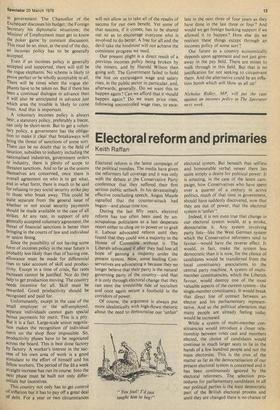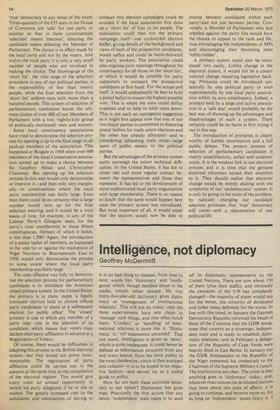Electoral reform and primaries
Keith Raffan
Electoral reform is the latest campaign of the political trendies. The media have given the reformers full coverage and it was only with the debate at the Conservative Party conference that they suffered their first serious public setback. In his devastatingly effective concluding speech, Angus Maude signalled that the counter-attack had begun—and about time too.
During the last fifty years, electoral reform has too often been used by unscrupulous politicians as a last desperate resort either to cling on to power or to grab it. Labour advocated reform until they found that they could win a majority in the House of Commons without it. The Liberals advocated if after they had lost all hope of gaining a majority under the present system. Now, some leading Conservatives are advocating it because they no longer believe that their party is the natural governing party of the country—and that it is only through electoral change that they can stem the irresistible tide of socialism and once again secure a foothold in the corridors of power.
Of course, the argument is always put more idealistically with high-flown rhetoric about the need to democratise our 'unfair' electoral system. But beneath that selfless and honourable verbal veneer there lies quite simply a desire for political power. It is amazing, in the case of the latest campaign, how Conservatives who have spent over a quarter of a century in active politics, much of that time in government, should have suddenly discovered, now that they are out of power, that the electoral system is 'unfair' !
Indeed, it is not even true that change in our electoral system would, at a stroke, democratise it. Any system involving party lists—like the West German system which the Conservative reformers tend to favour—would have the reverse effect. It would, in fact, make the system less democratic than it is now, for the choice of candidates would be transferred from the local constituency associations to the central party machine. A system of multimember constituencies, which the Liberals favour, would destroy one of the most valuable aspects of the current system—the single-member constituency. It would break that direct line of contact between an elector and his parliamentary representative. And so the political alienation that many people are already feeling toda) would be increased.
While a system of multi-member constituencies would introduce a closer relationship between votes cast and members elected, the choice of candidates would continue in much larger seats to lie in the hands of a few hundred people and not the mass electorate. This is the crux of the matter as far as the democratisation of our present electoral system is concerned and it has been continuously ignored by the electoral reformers. The selection procedures for parliamentary candidates in all our political parties is the least democratic part of the British electoral process and until they are changed there is no chance of 'true' democracy in any sense of the word. Three-quarters of the 635 seats in the House of Commons are 'safe' for one party or another so that in these constituencies 'selection' means 'election', selecting the candidate means selecting the Member of Parliament. The choice is in effect made by the local party and not by the voters. And within the local party it is only a very small number of people who are involved in making the choice. The drawing-up of the 'short list', the vital stage of the selection procedure in any of our political parties, is the responsibility of less than twenty people, while the final selection from the 'short list' seldom rests with more than a hundred people. This system of selection of parliamentary candidates leaves the ultimate choice of over 400 of our Members of Parliament with a tiny 'tightly-knit group of politically motivated' men and women.
Some local constituency associations have tried to democratise the selection process by opening it up in the final stage to all paid-up members of the association. This happened at Reigate in 1968 when over 600 members of the local Conservative association turned up to make a choice between Sir Geoffrey Howe and Christopher Chataway. But opening up the selection process in this way would only democratise or improve it—and then only very marginally—in constituencies where the local party membership was fairly large. Even then there could be no certainty that a large number would turn up for the final selection meeting, and it would be a total waste of time, for example, in any of the Labour Party's Glasgow seats, for the party's total membership in those fifteen constituencies, thirteen of which it holds, is less than 1,500! Again, the introduction of a postal ballot of members, as happened in the vote for or against the readoption of Nigel Nicolson in Bournemouth East in 1958, would only democratise the process to some extent where the local party membership was fairly large.
The only effective way fully to democratise the selection process for parliamentary candidates is to introduce the American closed primary system. In the United States, the primary is in many states 'a legally instituted election held to choose official party candidates to stand at a subsequent election for public office'. The 'closed' primary is one in which any member of a party may vote in the selection of its candidate, which means that voters must declare their party affiliation in advance at a Registration of Voters.
Of course, there would be difficulties in adapting this process to the British electoral system—but they would not prove insurmountable. The registration of party affiliation could be carried out in the autumn at the same time as the compilation of the electoral register. This would give every voter an annual opportunity to switch his party allegiance if he or she so wished. The greatly increased cost to the candidates and associations of having to conduct two election campaigns could be avoided if the local association first drew up a 'short list' of four to six people. The association could then run the primary campaign itself—one cyclostyled election leaflet, giving details of the background and views of each of the prospective candidates, would suffice and could be hand-delivered by party workers. The association could also organise joint meetings throughout the constituency for all those on the 'short list', at which it would be possible for party supporters to compare the prospective candidates at first hand. For the actual poll itself, it would undoubtedly be best to hold a postal ballot to ensure the highest possible vote. This is where the state could defray expenses and so help to keep costs down. This is not such an outrageous suggestion as it might first appear now that one of our two major parties is committed to financing postal ballots for trade union elections and the other has already allocated—and is considering allocating even more—large sums of public money to the political parties.
But the advantages of the primary system easily outweigh the minor technical difficulties. In the United States, it has led to closer ties and more regular contact between the representatives and those they represent. It has led to the developmerIt of more sophisticated local party organisation with large membership. There is no reason to doubt that the same would happen here once the primary system was introduced. But most important of all, it would mean that the electors would now be able to choose between candidates within each party and not just between parties. Conversely, a Member of Parliament who had rebelled against the party line would have the chance to appeal to the rank and file, thus encouraging the independence of MPs and discouraging their becoming mere 'lobby fodder'.
A primary system could also be introduced very easily. Unlike change in the electoral system, it would not be a constitutional change requiring legislative backing. Primaries could be introduced unilaterally by one political party or even experimentally by one local party association within its own constituency. Indeed, a primary held by a large and active association in a 'safe seat' would probably be the best way of showing up the advantages and disadvantages of such a system. There certainly could be no harm in first trying it out in this way.
The introduction of primaries is clearly worthy of further examination and a full public debate. The present process of selection of parliamentary candidates is clearly unsatisfactory, unfair and undemocratic. It is the weakest link in our electoral process and it is time that the genuine electoral reformers turned their attention to it. They should realise that electoral change would be merely dealing with the symptoms of our 'undemocratic' system. It is only by going to the roots of the problem, by radically changing our candidate selection protesses that `true' democracy will come—and a rejuvenation of our political life.



































 Previous page
Previous page